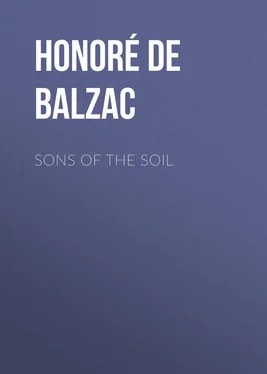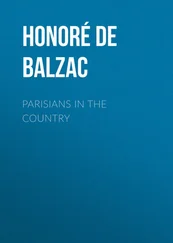Honoré Balzac - Sons of the Soil
Здесь есть возможность читать онлайн «Honoré Balzac - Sons of the Soil» — ознакомительный отрывок электронной книги совершенно бесплатно, а после прочтения отрывка купить полную версию. В некоторых случаях можно слушать аудио, скачать через торрент в формате fb2 и присутствует краткое содержание. Жанр: literature_19, foreign_antique, foreign_prose, на английском языке. Описание произведения, (предисловие) а так же отзывы посетителей доступны на портале библиотеки ЛибКат.
- Название:Sons of the Soil
- Автор:
- Жанр:
- Год:неизвестен
- ISBN:нет данных
- Рейтинг книги:5 / 5. Голосов: 1
-
Избранное:Добавить в избранное
- Отзывы:
-
Ваша оценка:
- 100
- 1
- 2
- 3
- 4
- 5
Sons of the Soil: краткое содержание, описание и аннотация
Предлагаем к чтению аннотацию, описание, краткое содержание или предисловие (зависит от того, что написал сам автор книги «Sons of the Soil»). Если вы не нашли необходимую информацию о книге — напишите в комментариях, мы постараемся отыскать её.
Sons of the Soil — читать онлайн ознакомительный отрывок
Ниже представлен текст книги, разбитый по страницам. Система сохранения места последней прочитанной страницы, позволяет с удобством читать онлайн бесплатно книгу «Sons of the Soil», без необходимости каждый раз заново искать на чём Вы остановились. Поставьте закладку, и сможете в любой момент перейти на страницу, на которой закончили чтение.
Интервал:
Закладка:
“May God bless you, my beautiful lady,” said Mouche, departing. “M’sieur le cure may feel quite sure that I’ll keep the things and wear ‘em fete-days, because you give ‘em to me.”
Emile and Madame Montcornet looked at each other with some surprise, and seemed to say to the abbe, “The boy is not a fool!”
“It is quite true, madame,” said the abbe after the child had gone, “that we cannot reckon with Poverty. I believe it has hidden excuses of which God alone can judge, – physical excuses, often congenital; moral excuses, born in the character, produced by an order of things that are often the result of qualities which, unhappily for society, have no vent. Deeds of heroism performed upon the battle-field ought to teach us that the worst scoundrels may become heroes. But here in this place you are living under exceptional circumstances; and if your benevolence is not controlled by reflection and judgment you run the risk of supporting your enemies.”
“Our enemies?” exclaimed the countess.
“Cruel enemies,” said the general, gravely.
“Pere Fourchon and his son-in-law Tonsard,” said the abbe, “are the strength and the intelligence of the lower classes of this valley, who consult them on all occasions. The Machiavelism of these people is beyond belief. Ten peasants meeting in a tavern are the small change of great political questions.”
Just then Francois announced Monsieur Sibilet.
“He is my minister of finance,” said the general, smiling; “ask him in. He will explain to you the gravity of the situation,” he added, looking at his wife and Blondet.
“Because he has reasons of his own for not concealing it,” said the cure, in a low tone.
Blondet then beheld a personage of whom he had heard much ever since his arrival, and whom he desired to know, the land-steward of Les Aigues. He saw a man of medium height, about thirty years of age, with a sulky look and a discontented face, on which a smile sat ill. Beneath an anxious brow a pair of greenish eyes evaded the eyes of others, and so disguised their thought. Sibilet was dressed in a brown surtout coat, black trousers and waistcoat, and wore his hair long and flat to the head, which gave him a clerical look. His trousers barely concealed that he was knock-kneed. Though his pallid complexion and flabby flesh gave the impression of an unhealthy constitution, Sibilet was really robust. The tones of his voice, which were a little thick, harmonized with this unflattering exterior.
Blondet gave a hasty look at the abbe, and the glance with which the young priest answered it showed the journalist that his own suspicions about the steward were certainties to the curate.
“Did you not tell me, my dear Sibilet,” said the general, “that you estimate the value of what the peasants steal from us at a quarter of the whole revenue?”
“Much more than that, Monsieur le comte,” replied the steward. “The poor about here get more from your property than the State exacts in taxes. A little scamp like Mouche can glean his two bushels a day. Old women, whom you would really think at their last gasp, become at the harvest and vintage times as active and healthy as girls. You can witness that phenomenon very soon,” said Sibilet, addressing Blondet, “for the harvest, which was put back by the rains in July will begin next week, when they cut the rye. The gleaners must have a certificate of pauperism from the mayor of the district, and no district should allow any one to glean except the paupers; but the districts of one canton do glean in those of another without certificate. If we have sixty real paupers in our district, there are at least forty others who could support themselves if they were not so idle. Even persons who have a business leave it to glean in the fields and in the vineyards. All these people, taken together, gather in this neighborhood something like three hundred bushels a day; the harvest lasts two weeks, and that makes four thousand five hundred bushels in this district alone. The gleaning takes more from an estate than the taxes. As to the abuse of pasturage, it robs us of fully one-sixth the produce of the meadows; and as to that of the woods, it is incalculable, – they have actually come to cutting down six-year-old trees. The loss to you, Monsieur le comte, amounts to fully twenty-odd thousand francs a year.”
“Do you hear that, madame?” said the general to his wife.
“Is it not exaggerated?” asked Madame de Montcornet.
“No, madame, unfortunately not,” said the abbe. “Poor Niseron, that old fellow with the white head, who combines the functions of bell-ringer, beadle, grave-digger, sexton, and clerk, in defiance of his republican opinions, – I mean the grandfather of the little Genevieve whom you placed with Madame Michaud – ”
“La Pechina,” said Sibilet, interrupting the abbe.
“Pechina!” said the countess, “whom do you mean?”
“Madame la comtesse, when you met little Genevieve on the road in a miserable condition, you cried out in Italian, ‘Piccina!’ The word became a nickname, and is now corrupted all through the district into Pechina,” said the abbe. “The poor girl comes to church with Madame Michaud and Madame Sibilet.”
“And she is none the better for it,” said Sibilet, “for the others ill-treat her on account of her religion.”
“Well, that poor old man of seventy gleans, honestly, about a bushel and a half a day,” continued the priest; “but his natural uprightness prevents him from selling his gleanings as others do, – he keeps them for his own consumption. Monsieur Langlume, your miller, grinds his flour gratis at my request, and my servant bakes his bread with mine.”
“I had quite forgotten my little protegee,” said the countess, troubled at Sibilet’s remark. “Your arrival,” she added to Blondet, “has quite turned my head. But after breakfast I will take you to the gate of the Avonne and show you the living image of those women whom the painters of the fifteenth century delighted to perpetuate.”
The sound of Pere Fourchon’s broken sabots was now heard; after depositing them in the antechamber, he was brought to the door of the dining-room by Francois. At a sign from the countess, Francois allowed him to pass in, followed by Mouche with his mouth full and carrying the otter, hanging by a string tied to its yellow paws, webbed like those of a palmiped. He cast upon his four superiors sitting at table, and also upon Sibilet, that look of mingled distrust and servility which serves as a veil to the thoughts of the peasantry; then he brandished his amphibian with a triumphant air.
“Here it is!” he cried, addressing Blondet.
“My otter!” returned the Parisian, “and well paid for.”
“Oh, my dear gentleman,” replied Pere Fourchon, “yours got away; she is now in her burrow, and she won’t come out, for she’s a female, – this is a male; Mouche saw him coming just as you went away. As true as you live, as true as that Monsieur le comte covered himself and his cuirassiers with glory at Waterloo, the otter is mine, just as much as Les Aigues belongs to Monseigneur the general. But the otter is yours for twenty francs; if not I’ll take it to the sub-prefect. If Monsieur Gourdon thinks it too dear, then I’ll give you the preference; that’s only fair, as we hunted together this morning!”
“Twenty francs!” said Blondet. “In good French you can’t call that giving the preference.”
“Hey, my dear gentleman,” cried the old fellow. “Perhaps I don’t know French, and I’ll ask it in good Burgundian; as long as I get the money, I don’t care, I’ll talk Latin: ‘latinus, latina, latinum’! Besides, twenty francs is what you promised me this morning. My children have already stolen the silver you gave me; I wept about it, coming along, – ask Charles if I didn’t. Not that I’d arrest ‘em for the value of ten francs and have ‘em up before the judge, no! But just as soon as I earn a few pennies, they make me drink and get ‘em out of me. Ah! it is hard, hard to be reduced to go and get my wine elsewhere. But just see what children are these days! That’s what we got by the Revolution; it is all for the children now-a-days, and parents are suppressed. I’m bringing up Mouche on another tack; he loves me, the little scamp,” – giving his grandson a poke.
Читать дальшеИнтервал:
Закладка:
Похожие книги на «Sons of the Soil»
Представляем Вашему вниманию похожие книги на «Sons of the Soil» списком для выбора. Мы отобрали схожую по названию и смыслу литературу в надежде предоставить читателям больше вариантов отыскать новые, интересные, ещё непрочитанные произведения.
Обсуждение, отзывы о книге «Sons of the Soil» и просто собственные мнения читателей. Оставьте ваши комментарии, напишите, что Вы думаете о произведении, его смысле или главных героях. Укажите что конкретно понравилось, а что нет, и почему Вы так считаете.












